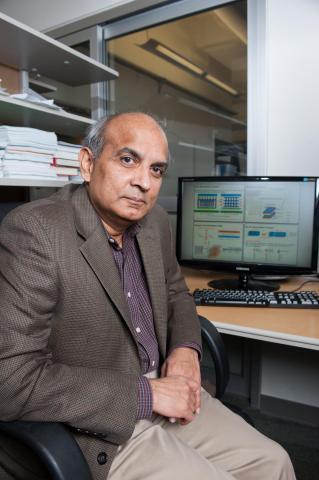The School of Electrical and Computer Engineering (ECE) at Georgia Tech will hold a memorial service honoring our beloved friend and colleague, Sudhakar Yalamanchili, on Wednesday, May 1 at 2 pm in the Klaus Advanced Computing Building, Room 1116 E/W.
The School of Electrical and Computer Engineering (ECE) at Georgia Tech will hold a memorial service honoring our beloved friend and colleague, Sudhakar Yalamanchili, on Wednesday, May 1 at 2 pm in the Klaus Advanced Computing Building, Room 1116 E/W. He passed away on March 23, 2019 after a long and courageous battle with multiple myeloma. The campus community is invited to attend this memorial.
Yalamanchili joined the ECE faculty in 1989, where he was most recently a Regents’ Professor and the Joseph M. Pettit Professor in Computer Engineering. When Yalamanchili joined the School, it was known as the School of Electrical Engineering, but was in the process of developing a computer engineering degree program. He was hired specifically to contribute to that effort, and in short order, he became its de facto leader. Throughout his career at Georgia Tech, Yalamanchili believed in building bridges rather than fences and viewed the computer engineering/computer science interface as a complementary one. He collaborated effectively with ECE and College of Computing (CoC) faculty and students in many different ways. As an example, he served as the co-director of the NSF Industry University Cooperative Research Center on Experimental Research in Computer Systems at Georgia Tech from 2003-2013.
Yalamanchili made seminal research contributions in high-performance computation and communication. His first two decades of research focused on high-performance multiprocessor communications, paving the way for today’s multicore processors and supercomputers. His group produced the first fully self-timed adaptive router and the first papers on power-efficient multiprocessor networks. Yalamanchili then shifted his attention to multicore and heterogeneous computing. His group produced the open source Ocelot dynamic compilation infrastructure for heterogeneous processors that was widely used in both industry and academia for computer architecture research. Yalamanchili's group also produced the Lynx and Manifold infrastructures, and most recently, they released the KitFox multi-physics modeling package for multicore architectures. He co-authored over 200 publications and was the PI or co-PI on more than $32 million of federal and industry funding at Georgia Tech.
Yalamanchili's educational contributions were both numerous and impactful, and he was a very highly regarded classroom instructor. He graduated 22 Ph.D. students, many of whom have garnered prestigious and competitive fellowships. Yalamanchili wrote or co-wrote three texts that have been adopted by numerous universities: VHDL: From Simulation to Synthesis; Interconnection Networks; and VHDL Starters Guide, 2ed. He developed numerous new undergraduate courses as the computer engineering (CmpE) curriculum evolved, and introduced several advanced courses at the graduate level. His contributions as an educator were celebrated when Eta Kappa Nu awarded him the 2018 W. Marshall Leach/Eta Kappa Nu Outstanding Senior Teacher Award.
An IEEE Fellow, Yalamanchili had a sustained record of excellence in service to the research community. He served on the editorial boards of the IEEE Transactions on Parallel and Distributed Systems, IEEE Transactions on Computers, and IEEE Computer Architecture Letters. Leading conferences in computing are considered on par with IEEE and ACM Transactions, and Yalamanchili served as program chair and general chair, as well as a member of numerous program, steering, and organizational committees in leading venues, including more than 60 since 2009.
Yalamanchili was very committed to service within both the Georgia Tech and ECE communities. On the Institute level, he served on committees ranging from research cyberinfrastructure to the Provost’s Reappointment, Promotion, and Tenure (RPT) Committee to interdisciplinary research group activities. At the School level, Yalamanchili regularly assumed leadership roles in the growth and operations of ECE. He was a leader in three separate re-designs of the CmpE curriculum since 1989, in response to rising enrollments and fast-changing content. Yalamanchili was the PI in several early efforts to ensure that the CmpE laboratories had the latest equipment and state-of-the-art technical tools. He served several times as chair for the CmpE technical interest group (TIG) and on the School’s RPT Committee. In 2010, Yalamanchili chaired the CmpE Working Group comprised of internal and external members tasked with developing a strategic vision for the growth of computer engineering, which led to the division of CmpE into two new TIGs, Computer Systems and Software and VLSI Systems and Digital Design. He also served for a year as the Computer Systems and Software TIG chair.
Finally and perhaps the main reason why he is so beloved, Yalamanchili excelled in mentoring junior faculty colleagues in both ECE and CoC. He received the D. Scott Wills ECE Distinguished Mentor Award twice during his career, in 2007 and 2014. Junior faculty members in both ECE and CoC say that Yalamanchili’s friendly support and mentorship has been crucial to their careers, helping transform them from newly minted Ph.D. graduates to faculty members at an elite institution. He helped to connect faculty with industry and government sponsors and gave advice on research topics and student-related issues. Yalamanchili was a great role model not only because of his accomplishments, but because of how he conducted himself and treated others. Though Yalamanchili was highly successful, he always understood and appreciated all the challenges, no matter how inconsequential they may seem, that junior faculty face.
Yalamanchili reflected the best of Georgia Tech and ECE, and all of our lives have been made richer from having known him. Please join us in keeping the Yalamanchili family in your thoughts and prayers during this sad and difficult time.
